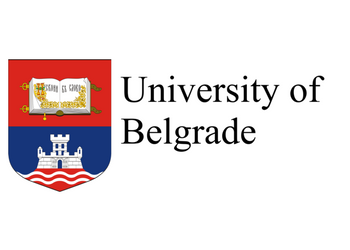

University of Belgrade
speciality: Communication
What is a Communications degree?
Communications is a universal degree, which explores the traditional forms of communication such as verbal, physical, visual and written communication but also extends beyond that to cover mass communication and social media. There are different types of communications degrees depending on the degree level.
Overall, Communications focuses on teaching effective communication through social media, web, print, mass media and verbal communication. However, there are two types of Communications degrees that exist. For instance, a Bachelor of Arts in Communications in the US is focused on preparing students for careers that are connected to writing, marketing, promotions, journalism and public relations. In contrast, Bachelor of Science in Communications is dedicated to the technology used in the science behind modern communication and prepares students for careers in production or sound engineering.
A Communications degree teaches students about how media and communication influences cultures, societies and people’s identities. It involves a significant amount of critical writing and research and covers different disciplines such as journalism, public relations, entertainment production, marketing, event planning and so many more disciplines, which are somehow connected to exchanging information and conveying messages. There are also different specialization options associated with this degree, including political communication, mass media, journalism, health communication, etc.
It is worth noting that a Communications degree has many intersection points with psychology, sociology, linguistics and in some cases politics.
Benefits of a Communications degree
The main benefit of a Communications degree is its universal nature. It applies to almost any subject or professional setting. For example, some of the top careers in the field of Communications include announcers, art directors, editors, broadcast and sound engineering technicians, reporters, correspondents, broadcast analysts, technical writers, writers and authors, interpreters, translators, etc. Therefore, it keeps students’ career options open and doesn’t require them to have a predetermined career path that they want to follow.
Communications degrees prepare students to make an impact from the start of their careers unlike other degrees, which require further training. This is possible thanks to the multitude of professionally accredited degrees in Communications, which develop students’ abilities based on the established standards in the field. Moreover, there are many Communications courses, which offer work placement opportunities that enable students to gain the required professional skills before they have even started their career.
Another benefit associated with Communications degrees is the fact that they develop students’ written and verbal communication skills significantly.
A major advantage of Communications over other degrees is that in most cases there are no prerequisites required to study Communications.
Communications degree structure
The duration of a Communications degree varies depending on the country and degree level. For example, Higher Education Institutions in the UK offer 3-year Bachelor’s courses. In some cases, the course may extend to four years if students are given the opportunity to spend a year abroad or in industry between the second and third year through a sandwich course. Bachelor’s degrees in Communications in the US usually take around four years to complete.
Over the duration of a Bachelor’s Communications degree, students are expected to learn and be able to apply the established communications theories by developing the technical skills required to work in a professional setting. In the first year of their studies, students learn predominantly how media and communication influences cultures, societies and people’s identities. Optional modules may introduce them to professional communication, journalism, documentary, film-making, marketing, etc. In addition to the introductory topics, this degree allows students to learn about more complex areas of communications such as interpersonal relations, brand management and linguistics at a later stage. For instance, the second and third years enable students to get a deeper understanding of theoretical concepts related to media and culture and develop practical skills in research and communications. Additionally, students may have the opportunity to take optional modules and pursue their interests in different areas related to Communications such as gender, race, youth, culture, digital media, political communication, public relations, etc.
The most common duration of a Master’s degree in Communications is between 1 and 2 years depending on the mode of study (full-time or part-time) and country.
PhD and MPhil degrees in Communications require students to dedicate anywhere between 3 and 6 years to their studies depending on the mode and country of study.
4 Student Reviews
Filter reviews-
Business, Language ...07 Apr, 2022
 StudentProfessor of Italian language
StudentProfessor of Italian languageI am quite satisfied with the programme, there is a vast amount of culture and literature, we gather a lot of general knowledge about the world, but there should be more guidelines for working in the market.
View moreProgramme: Business, Language and CultureDegree: Bachelor'sGraduation: 2022Delivery Type: BlendedCampus: Belgrade -
Language for ...29 Aug, 2021
 StudentOrganization, perspective
StudentOrganization, perspectiveI am studying at the Faculty of Philology in Belgrade, majoring in Arabic. The department is very poorly organized, the professors are not interested. Too much material is covered and a lot of independent work is needed. In the first year of studying we go through too easy things in class, while in the second year we start with much harder things and it is difficult to achieve all that because the jump is huge. Online teaching is a disaster, too much information, lecture after lecture and a lot of homework. Also, as our former professor, who was, among other things, the head of the department, says, “we are not educating you here to agree on the streets of Cairo with the sellers, but to translate.” If I were to write something again, it would certainly not be a philological course, and especially not a course in Arabic language and literature. Life in Belgrade is good, I live in an apartment with a roommate who pays € 200, and she means a total of € 400. I am also happy with the nightlife. The faculty is located in a great location, in the city center. The student canteen is close to the college, the food is great and very affordable. The possibilities after finishing college are diverse if you ask me, someone might work as a translator, someone as a flight attendant, but he will go somewhere over, everything is as it is. My idea is to go to a master of digital marketing in Europe and after finishing it I try to connect it with the Arabic language.
View moreProgramme: Language for Intercultural CommunicationDegree: Bachelor'sDelivery Type: Online -
Business, Language ...13 Jun, 2019
 Studentlanguages
StudentlanguagesI think this faculty is very good for general knowledge of the culture of a nation of language and civilization. The program we study is called language, literature and culture. Although, language and literature are learned the most, we get enough general knowledge about the culture itself. I am satisfied with my faculties, with my own department, because it provides great opportunities for my own development.
View moreProgramme: Business, Language and CultureDegree: Bachelor'sGraduation: 2022Campus: Belgrade -
Business, Language ...08 Mar, 2019
 StudentYou get real knowledge in your area, but you aslo get involved a bit in other areas as well.
StudentYou get real knowledge in your area, but you aslo get involved a bit in other areas as well.I study arabic language, literature and culture and I believe that me and my friends get proper knowledge in this area. But also, we are sort of obligated to choose additional subjects from other departmans, and I find that okay, because we get involved with other aeras. Arabic language is a bit tricky, and it requieres going to an Arabic country to practise, but what you learn here at college is a very good base!!! __You have 6 or 7 subjects per semester which may sound a lot (12 or 14 per year) and it may sound a lot, you can do the exams at least 6 times per year. And if you don’t pass the exam you can re-do it next year, you don’t fail the whole year.__The problem is financing the college. You have to have 48 or more points in order not to pay for the studying. And you collect those points passing the exam.__Points for the marks are collected by going to classes and on the exam.__Now, organization at college of philology is not the best. Actually, it’s aweful, but profesors are really cool and we manage to make a deal with them when needed.__And for the staying, you can apply to get a room in the campus or rent the appartment.
View moreProgramme: Business, Language and CultureDegree: Bachelor'sCampus: Belgrade

